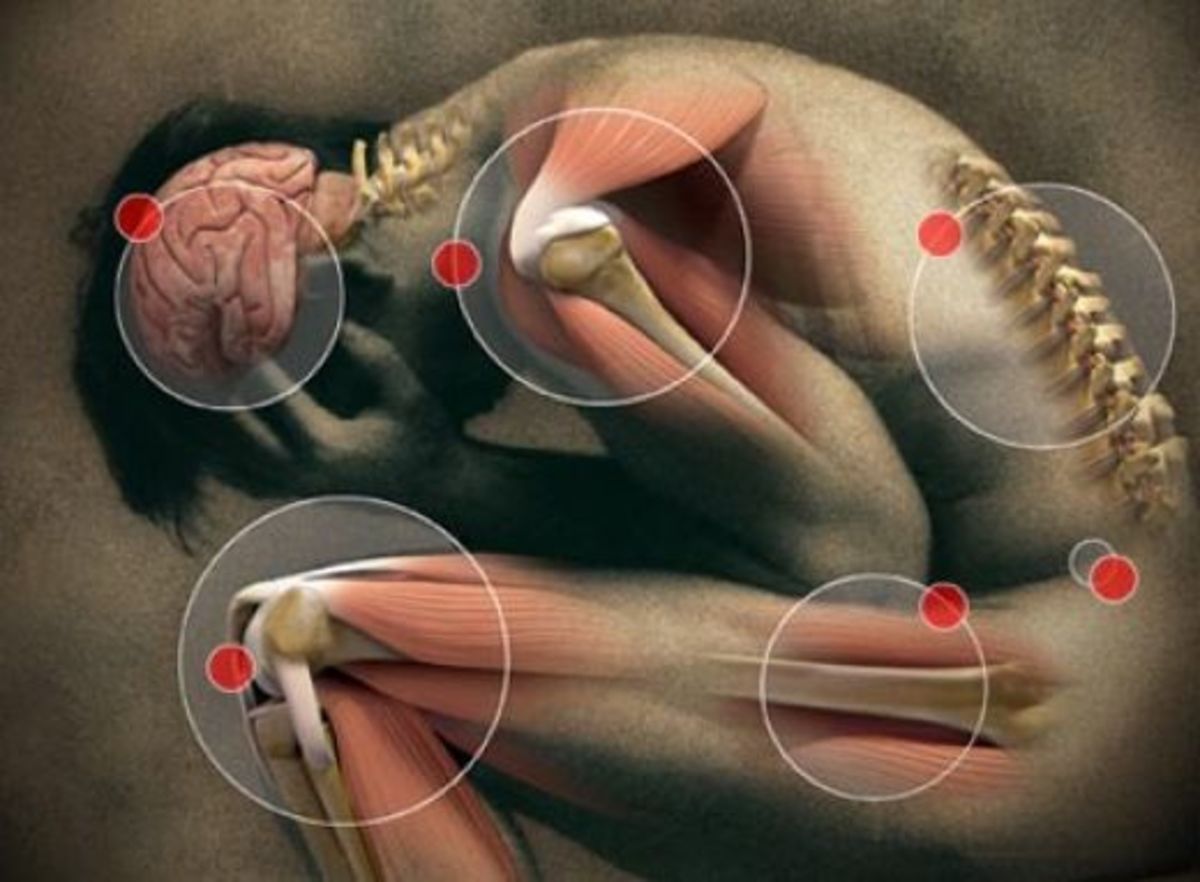Opioids, Relentless Suffering and Alternative Solutions
Pain and Ellusive Relief

Pain - The Ultimate Compromiser
People will relate or not relate to this Hub based on their prior experience with prolonged pain and their success (or failure) to find remedy through one of the various opioids prescribed by physicians.
Your thoughts about pain relief will vary depending on whether you happen to be suffering from degenerative joint disease, arthritis, back pain or other ailments that cannot be ameliorated by over-the-counter medications.
My entree into this field began when I blew up a disc in the L3 region of my back. Strangely, the blow-up occurred at work while trying to lift one of the old CRT monitors from a precarious position. I felt something pop in my low-back, but I got through the day with just a bit of tenderness.
The next morning at home the pain ushered in with a force I had never encountered before. For me, it was a shocking level of pain. Years later I read a woman's account of a similar experience. She described it as having all three of her children in one moment of time.
I was unable to stand or even lift myself to a chair. I was left to crawl around the apartment on my hands and knees.
I was working on a contract basis, and, after three weeks of debilitation, I lost my job. During this three-week period, I could find no relief from the suffering. For the greater part of the day and all of the night I lay prone on the floor.
I finally had my wife dress me and I went to see a doctor who, after an examination, prescribed Hydrocodone -- a generic name for Vicodin. Thus began my love/hate relationship with this drug.
Hydrocodone was very successful at taking the edge off the pain. The pain was still there, but I didn't notice it as much. As such, it also helped elevate my mood. The doctor who attended me prescribed a two-week dose. When the two weeks passed, the full intensity of the pain returned, so I went back to the doctor for a refill, which he refused to provide.
After that I began doctor shopping, having to repeat the examination for my back pain over and over again in order to get an opioid-grade pain reliever. Not only was this shopping inconvenient, it was painful, but it was the only way I knew to alleviate my suffering.
After the initial prescription, the doctors pretty much quoted the same verses -- that the medication was "ADDICTIVE." I didn't give a rat's ass whether the medication was addictive or not. I just wanted to be able to function in a semblance of the person I had been.
Since the doctors were so difficult, I enrolled in a chiropractic clinic that also had an MD on staff to peddle out the Hydrocodone. After one year of chiropractic therapy, my back pain seemed to all but go away. I later learned that a disc impingement on the sciatic nerve (called sciatica) often will get better after about a year's time -- with or without treatment. So, I will never know with certainty whether the chiropractic sessions (three per week) helped my condition or not.
The sessions were expensive, but if nothing else, the therapy gave me the illusion I was treating my problem. The MD reduced my dosage of Hydrocodone until I was off it completely. Unfortunately, the improved condition did not last, and I was back on my hands and knees.
Again I sought medical treatment and was prescribed Hydrocodone, but only for a few week periods. For me, this was maddening and unacceptable. So, I turned to the Internet and found that I could purchase Hydrocodone via what could only be described as the black market. The Internet advertisers numbered in the hundreds, and the amount of qualifying material needed varied.
The cost of the transactions were astronomical. But, I seemed to have little or no choice other than to pay for the drugs through the back door. This situation lasted for about a year or two. I racked up thousands of dollars of debt on my credit cards to pay for the Hydrocodone, which was priced somewhere at 100% above normal and customary costs.
On the positive side, the drug enabled me to continue working (if with a few unpleasant side effects). Eventually, the housing bubble in California exploded, and I was out of a job. No longer able to afford the medication, I decided I needed to get off the Hydrocodone, and I chose to do this "cold turkey" -- something I would strongly advise no one ever attempt to undertake.
The withdrawals were mind-shattering. At the worst of it I felt as if insects were crawling inside my body. This lasted for about one month. To put it mildly, the period was torture. I felt as if my body aged a good five years in the process.
The next segment involved living with the pain -- being able to walk only a few short steps, being unable to stand more than a few minutes, being in constant pain -- even while lying in bed.
Eventually, I sought the help of a surgeon who specialized in removing herniated discs through micro-surgery. The surgery itself was nearly painless, and it succeeded in alleviating the crippling low-back pain from which I had been suffering for years. The effect was immediately noticeable.
To those who are suffering from a similar condition, I would recommend seeing a surgeon for a minimally invasive type of surgery. I think sciatica sufferers can find amazing relief. Since then, as the surgeon warned, the pain returned but not with the previous intensity. I can have low-back pain lifting groceries out of the car trunk or doing any kind of household chores. But, I can minimize the pain using plain old aspirin or ibuprofen.
It's unpleasant, but something with which I can live.
The debate about the use of opioids rages on amongst doctors, hospitals, specialists, the government, pharmaceutical companies, and patients. From my perspective, the opioids are lousy for long-term pain relief. A patient can become dependent (hooked) on them after a couple of weeks. Initially, no patient should be denied any type of pain relief. To do so would be inhuman. Long-term use of opioids is not an answer, since the physician is forced to increase the dosage as the patient becomes tolerant after a short period. Few doctors are willing to prescribe pain relievers beyond a couple of weeks. They face admonishment from peer review boards and also possible litigation if things go wrong. Some patients purposely overdose (especially with the help of some booze) and end up dead. The grieving relatives look toward the doctor as the source of destruction. The doctors already pay high insurance premieums against malpractice suits, so they prefer to keep themselves safe and let their patients simply suffer.
The side effects and withdrawal symptoms are very serious and nothing to sneeze about. In some cases, a surgical approach is the only answer -- such as with back pain. Back-pain surgery is risky but not freak-out risky in the hands of a competent surgeon. People suffering from bad joints also need to go the surgical route. For severe arthritis, I don't know.
I stalled having back surgery because I had listened to so many horror stories about post-operative complications. But, desperation drove me to give it a chance. I simply didn't give a damn any more. Either I would wake up feeling better or I'd be a vegetable -- I felt I had nothing to lose in throwing the dice.
If an individual is facing an end-of-life struggle against pain, I say let them absorb as much morphine as required. The dependency argument becomes ridiculous and mute at that level.
For those who are hesitating/afraid of an "ultimate solution" to their pain problem, I would simply say, go ahead. When the quality of your life becomes substantially diminished because of constant pain, you basically have little to lose. A life filled with pain is not worth living. Be brave and take the chances that are open to you. Take the gamble, but do so under an informed state of mind.







